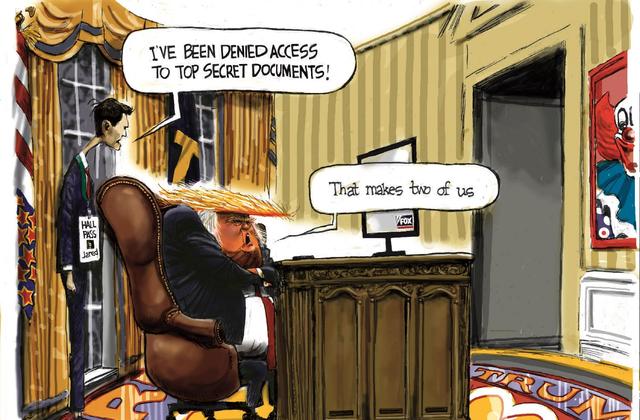The DCCC's Texas-Sized Screwup
Texas shows why national committees need to stay out of primaries.

Bang up job, everybody.(AP Photo/Eric Gay)
Everything is bigger in Texas – including, apparently, the Democratic Congressional Campaign Committee's screwups.
Texas held its 2018 primaries Tuesday for a host of offices, including governor and U.S. Senate. Much of the post-game analysis on Wednesday involves looking for signs that the state, the very epitome of Republican-held red on America's electoral maps, might be heading toward purple status, giving Democrats hope of gaining a toehold there.
But the results also show how Democrats desirous for a renaissance in the Lone Star State and elsewhere can be ill-served by their national party.
In Texas' 7th congressional district, Democrats are optimistic about ousting Republican Rep. John Culberson. It's one of those suburban areas where the residents are maybe not so thrilled with President Donald Trump; while the district was won handily by Republican presidential nominee Mitt Romney in 2012, in 2016 it flipped to Democratic nominee Hillary Clinton. Culberson also has some vulnerabilities when it comes to leaving his constituents hanging on hurricane-related matters, which has Democrats thinking he is ripe for the picking.
Herein is where things went awry. A bunch of candidates were running in the Democratic primary for the right to take on Culberson, and the DCCC decided that one, Laura Moser, was too progressive to win. So the committee went full-on negative against her, taking the very unusual step of releasing opposition research painting her as a carpetbagger. And it was dishonest opposition research, to boot, portraying a comment that she had made about not wanting to move back to her Texas hometown as if she had said she never wanted to live in Texas again, period. (She had already moved back to the state from D.C., for the record.)
The attempt to drag Moser was so hamfisted that Democratic National Committee Chairman Tom Perez felt compelled to weigh in saying it was a mistake. And the whole thing also backfired from the DCCC's perspective, as Moser finished second in the voting, sending her to a run-off against first-place finisher Lizzie Pannill Fletcher in May.
Depending to who you talk to, it was the DCCC's offensive that pushed Moser over the finish line; it certainly helped with her fundraising.
Cartoons on President Donald Trump

"We have to fix our broken politics – and that starts by rejecting the system where Washington party bosses tell us who to choose," Moser said in an ad. "We tried that before and look where it got us."
Indeed, it's hard not to smell the stink of the 2016 primaries all over this race, when the DNC decided early on that Clinton was its candidate, no matter how the actual elections shook out. (No, this does not mean anything was "rigged.") Our Revolution, which formed from independent Vermont Sen. Bernie Sanders' unexpectedly vigorous presidential campaign, endorsed Moser at the end of her race. Labor, too, seems like it will have her back, as Fletcher's law firm has done some nasty anti-union work. It looks possible the election in May will be a tight one.
There are two lessons to take away from the DCCC's own goal, then, and the other meddling in which it engages across the country. The first is that the national Democratic Party needs to realize in many places its brand is so toxic that telling voters to do one thing basically guarantees they'll do something else. This is particularly true after the 2016 election, when a supposed slam dunk resulted in a reality television actor taking the presidential oath of office.
Intervening also has the potential to make everyone's life much more difficult. To wit, the DCCC didn't want Moser in the race, but it's now not only likelier that she wins the nomination, but also the case that the news cycle is focused on one of the political media's favorite topics: Democrats being in disarray, unable to get their act together.
Bang up job, everybody.
Far more importantly, national apparatchiks and consultants need to stop trying to press an outdated model onto every election. According to the pundits and prognosticators, to win in places that have traditionally been conservative, Democrats need to sound and act like Republicans. Perhaps, though, that's not the case: Maybe they just need to sound and act differently than other Democrats. If that means anti-corporate, inequality-focused populism that calls for single-payer health care, maybe it can work.
I, of course, don't know for sure what's going to fly in any particular election. Neither, however, do Democrats making decrees from on high. The DCCC should focus on keeping whackadoodles and nutjobs out of races, not perfectly acceptable candidates who want to try something different.
Sure, some districts likely do need a Republican-lite. But maybe an entirely new brand of progressive politics that doesn't, say, sell the country out to Wall Street, could be successful too in parts of the country historically reluctant to elect Democrats. We won't know until someone tries. And the DCCC needs to back off while they do.
Pat Garofalo, Assistant Managing Editor for Opinion
Pat Garofalo is assistant managing editor for opinion at U.S. News & World Report. Email him at... READ MORE »Pat Garofalo is assistant managing editor for opinion at U.S. News & World Report. Email him at pgarofalo@usnews.com and follow him on Twitter at @Pat_Garofalo.
Recommended
Don't Blame Video Games
David ZendleMarch 8, 2018
The Medicaid Freeloader Fallacy
Rachel GravesMarch 8, 2018
Now We're Talking
Michael H. Fuchs March 8, 2018
Wave? What Wave?
Peter RoffMarch 7, 2018
Boots on the Ground in Schools
Nat Malkus March 7, 2018
